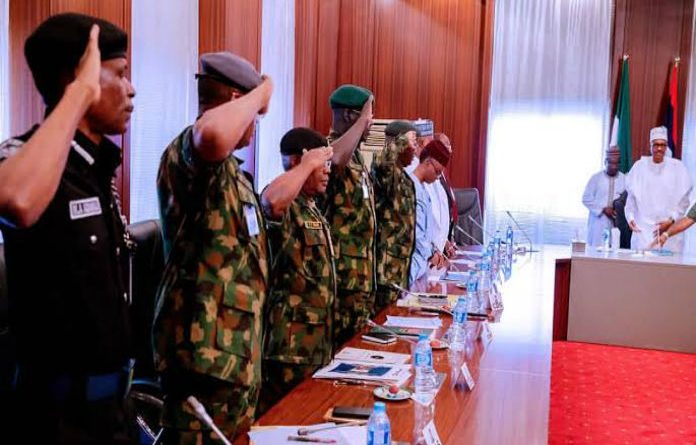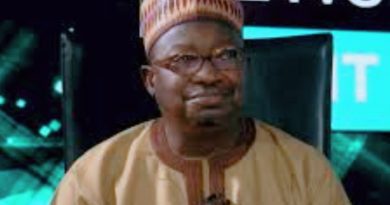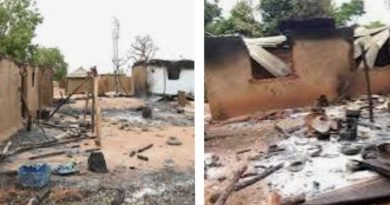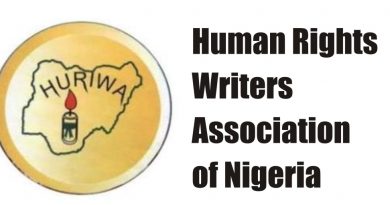The Legality Of Service Chiefs Retention
For a country’s military to be on top of the game in the discharge of its constitutional responsibilities, its professional and institutional effectiveness must be robust. Since Nigeria’s return to democracy, these haven’t fared better like now.
Before the current military chiefs assumed office, almost every part of the north were, almost on a daily basis, attacked by Boko Haram, but that is no longer the case. Only in the north east cases of attacks are being recorded. Even at that, the attacks are not as stark and frequent as they were before their assumption of office.
Boko Haram declared a caliphate that spanned 11 local councils in states such as Borno, Yobe and Adamawa and reigned with absolute impunity over about 1.7 million people in those councils, according to the 2006 population figures.
Insecurity was profound in the Northeast, infrastructure destroyed, farmlands were deserted, markets became desolated, schools were constantly violated and large-scale humanitarian crisis that still bites very hard today planted itself in the region.
But that despicable part of the Nigerian history is fading away, giving room to a rising hope. And the country has its military—often maligned, yet celebrated—to thank for that.
Brutal attacks on soft and military targets are becoming infrequent. Markets and roads are opening up to new possibilities.
Schools are welcoming back students, and smiles are returning to faces that have shed too many tears for the loss of loved ones.
With the military’s recently launched mission, Operation Last Hold, it is hoped that the task of totally decimating the insurgents will be achieved.
Very noteworthy, in 2015, Boko Haram was so potent to the extent that the general election had to be postponed. That was not the case in 2019, thanks to the current military power.
Beyond these, the Nigerian military has been integral to the maintenance of the internal security in different states and have been drafted, at different times, to quell internal uprisings and strifes.
In some instances, they have been staples of different special security outfits set up by different states.
The Nigerian military is far from being a local champion with limited influence. As the country continues to play the role of a big brother within the Economic Community of West African States (ECOWAS) and elsewhere in Africa, the military has lent its helping hands to the cause of protecting the territorial sanctities of countries like Mali, Liberia, Sierra Leone and, lately, The Gambia.
However, the military has also found its way into other aspects of society outside combat, which they were uniquely trained for.
They have helped organise medical outreaches and vocational training, and built roads and bridges, especially in places ravaged by Boko Haram insurgency. All these point to the robustness and effectiveness of our military.
However, there have been hues and cry over the tenure of the military chiefs, with calls to the President to remove and replace them with their juniors, especially in view of the fact that they have already elapsed their respective service years.
What people seems to be amnesic of is the fact that the President is a retired general with vast understanding of the arts of war. While some are saying that they should be immediately removed in order for fresh ideas to be injected into the military thereby ‘totally’ crushing the remnant of Boko Haram, others are are of the opinion that they should be simply removed to eschew stagnation in ranking and for their juniors to step up.
The people making these ‘noises’ should rather be careful, given the fact that securing a country is so dicey that it is not everyone that should be throwing their ‘amateurish’ opinions. Obviously, the President is retaining the chiefs because of successes they have been able to record in relatively securing the nation, especially against Boko Haram territorial occupation.
Secondly, in the Nigeria military today, there is no officer who surpasses them in understanding the insurgency, hence they should take the fight to its end which is already in sight.
On the constitutionality of their retention; it is absolutely constitutional. According to the Harmonised Terms and Conditions of Service of Chiefs Officees (Revised 2017), Section 11.09 says: … “the President C-in-C reserves the prerogative to extend the tenure of the CDS/service chief irrespective of his age or length of service.”
The above section clearly explain this. The President has all the prerogative to retain the Service Chiefs as long as he deem fit and, as his tenure last. This could be altered only by the constitution. However, for now there is no constitutional legislation on this.
The people saying their tenure is illegal would study Section 11.08 which provides two years appointment and two years renewal without considering Section 11.09. I don’t know what that civic duty of understanding the constitution is.
I read a beautiful write-up by one of the Nigeria’s leading online publisher, Mr Yushau A. Shuaib, entitled ‘Boko Haram: Memo to President Buhari on Service Chiefs.’ The memo is well written, however fall short of reality and is of factual errors. The appeal for the change of service Chiefs as contained in the memo is not out of patriotism, especially making such a call at this time. Those pushing for the change were ignorant of the powers of the President and C-in-C on the matter and , or deliberately refused to provide the writer with all the information on same as contained in the document he relied his argument on.
In my opinion, the outcry for change of service Chiefs is not borne out of patriotism and passion to serve the nation but rather for selfish interests. It is more worrisome if such push is coming from some officers in the armed forces. It would be therefore right to say that such officers are disgruntled and are nursing self serving ambitions. They should be ignored.
The President and Commander-in-Chief should not be distracted. It could be said that the general performances of the leadership of the Services is not at same level; this therefore calls for the need for other services to buckle up. Nonetheless, let the Service Chiefs be; Nigeria is at war and you can’t change them now, they are doing a pretty good job.




